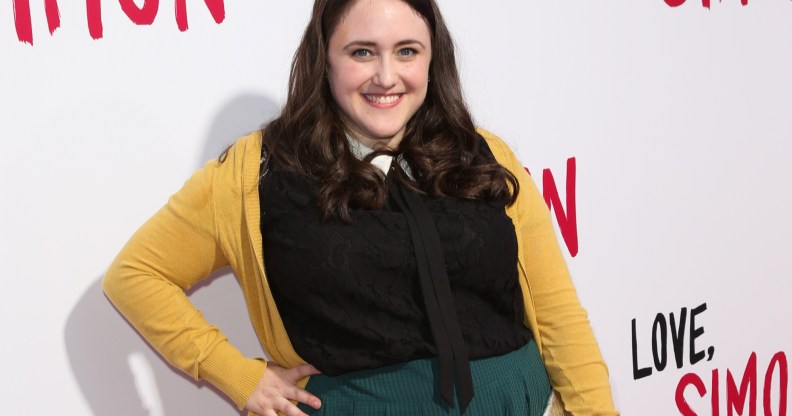Love, Simon author Becky Albertalli forced to come out as bisexual after weathering criticism for telling queer stories

Author Becky Albertalli attends the Love, Simon special screening at the Westfield Century City on March 13, 2018 in Century City, California. (Paul Archuleta/FilmMagic)
Becky Albertalli, the author of Love, Simon, has come out as bisexual in an essay aimed at her critics who accused her of profiting off the LGBT+ community.
Albertalli, whose original novel Simon vs the Homo Sapiens Agenda sparked the 2018 rom com Love, Simon and the recent Hulu spin-off Love, Victor, has historically identified as a straight woman.
In her essay for Medium, said she has been repeatedly accused of “profiting off of communities I had no connection to” and being “the quintessential example of allocishet inauthenticity”.
Albertalli wrote: “I’m 37 years old. I’ve been happily married to a guy for almost ten years. I have two kids and a cat. I’ve never kissed a girl. I never even realised I wanted to.
“But if I rewind further, I’m pretty sure I’ve had crushes on boys and girls for most of my life. I just didn’t realise the girl crushes were crushes.
“Every so often, I’d feel this sort of pull toward some girl I vaguely knew from school or camp or after-school dance class. I’d be a little preoccupied for a few weeks with how cool or cute or interesting she was, and how much I wanted to be her friend.
“It just never occurred to me that these feelings were attraction.”
The Love, Simon author said she “grew up in the 80s and 90s in a conservative southern US suburb”, and added: “I’d met a few people who were openly gay or lesbian, but I don’t think I met an openly bi person until college.”
However when writing Leah on the Offbeat, the sequel to Love, Simon which features a love story between two girls, the author said she began to “question things”.
But the criticism focused on her sexuality, she said, meant: “I slammed the lid down on that box and forgot I’d ever cracked it open.”
She continued: “You know what’s a mindf**k? Questioning your sexual identity in your 30s when every self-appointed literary expert on Twitter has to share their hot take on the matter.
“Imagine hundreds of people claiming to know every nuance of your sexuality just from reading your novels. Imagine trying to make space for your own uncertainty.
“Imagine if you had a Greek chorus of internet strangers propping up your imposter syndrome at every stage of the process.”
Now, coming out as bisexual, Albertalli said that this wasn’t how she wanted to do it.
“This doesn’t feel good or empowering, or even particularly safe,” she said. “Honestly, I’m doing this because I’ve been scrutinised, subtweeted, mocked, lectured, and invalidated just about every single day for years, and I’m exhausted.
“And if you think I’m the only closeted or semi-closeted queer author feeling this pressure, you haven’t been paying attention.”
She said she wanted to be clear that she wasn’t trying to “neutralise criticism” of her novels, but added: “If I can ask for something, it’s this: will you sit for a minute with the discomfort of knowing you may have been wrong about me?
“And if your immediate impulse is to scrutinise my personal life, my marriage, or my romantic history, can you try to check yourself?”
She finished her powerful essay: “Anyway, all of this is to say: I’m bi. Sorry it took me so long to get here.
“But then again, at least the little red coming out book I needed was already on my shelf (in about 30 different languages).
“I think I finally know why I wrote it.”

